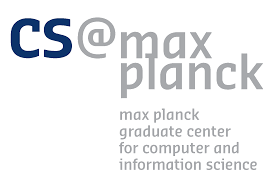CS@max planck is a highly selective doctoral program that grants admitted students full financial support to pursue doctoral research in the broad area of computer and information science, with faculty at Max Planck Institutes and some of the best German universities.
To qualify for the program, students must hold a Bachelor’s or Master’s degree in computer science (or a related field) and have an outstanding academic record. We especially encourage applications from students who wish to explore research across the CS spectrum before committing to a topic and advisor.
Students normally start their graduate studies at the Saarland Informatics Campus in Saarbrücken. While taking courses, they have the opportunity to explore research in different areas as part of immersion labs at different MPIs and universities. Latest in the 4th semester, they take the qualifying exam and start work with their chosen research advisor(s) at any of the participating MPIs or universities.
Why choose CS@max planck?
- CS@max planck offers an internationally renowned research community, with world-class faculty across the full spectrum of computer and information science.
- CS@max planck offers a stimulating environment that includes the top research institutes and universities in Germany, including the MPI for Informatics, MPI for Intelligent Systems, MPI for Software Systems, and their partner universities.
- Before committing to a research topic, admitted students have the opportunity to explore different areas across the full spectrum of computer and information science. After committing to a group, students may continue to collaborate with other groups throughout the program.
- All admitted students are offered full financial support.
- There are opportunities to transfer technology developed as part of graduate research with support from the Max Planck Society.
- CS@max planck offers an English-speaking, multicultural, and diverse working environment.
Admission
Admission to the program is highly competitive. A Bachelor’s degree or a Master’s degree in CS or a closely related field from a top-tier institution of higher education is required. Applicants should have an outstanding academic record (at or near the top of their class), proficiency in spoken and written English, and strong letters of recommendation from their past academic advisors or work supervisors. Prior research experience is welcome but not required.
Application Procedure
Applications are accepted only through the online application system. You will need to provide the following material:
- CV
- transcripts
- statement of purpose
- contact information of at least two references providing recommendations
- English test scores (TOEFL, IELTS or Cambridge Test) are required unless you are a native speaker or have received a significant part of your education in English.
- GRE scores are encouraged
You need to submit a complete application before we can process it. (The website displays missing fields in red.) Completed applications can be updated subsequently, e.g. to add an additional reference. We request references only for those applicants that pass a first round of review, i.e., we do not request references automatically.
Application Deadline
Applications for Fall admission must be completed by December 31 of the previous year. Phone or Skype interviews may be conducted with candidates short-listed for admission.
Life in Germany
Living and Working in Germany
The booklet Living and Working in Germany from the Max Planck Society has most of the important information regarding visas, health insurance and medical care, finding and renting an apartment, and public transportation. It also includes useful checklists for what you need to bring and what you will need to take care of initially.
Fileds of expertise: Algorithms, Artificial Intelligence, Artificial Neural Network, Big Data, Computational Sciences, Computer and Society, Computer Architecture, Computer Communications (Networks), Computer Graphics, Computer Vision, Computing in Mathematics, Natural Science, Engineering and Medicine, Computing in Social science, Arts and Humanities, Cyber Security, Data Mining, Data Structures, Databases, Distributed Computing, Game Design, Human-computer Interaction, Informatics, Information Science, Information Systems (Business Informatics), Machine Learning, Machine Vision, Operating Systems, Parallel Computing, Programming Languages, Quantum Computing, Software Engineering, Theory of Computation



 Αφίσα
Αφίσα Ανακοίνωση
Ανακοίνωση
